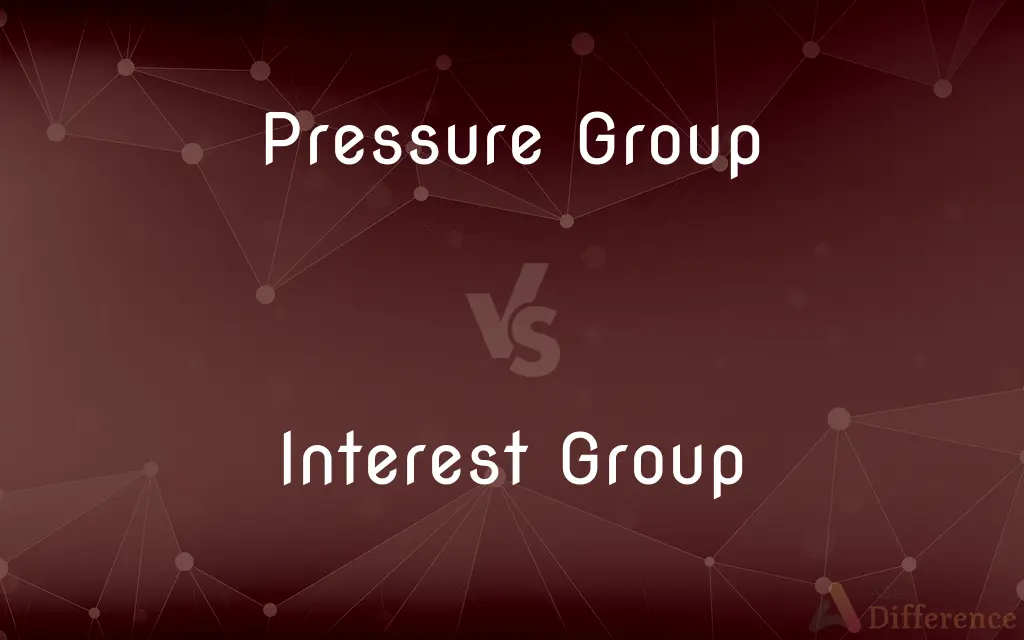Pressure Group vs. Interest Group — What's the Difference?
Edited by Tayyaba Rehman — By Fiza Rafique — Published on December 19, 2023
Pressure groups actively seek to influence policymakers, while interest groups represent shared interests without necessarily exerting direct pressure.

Difference Between Pressure Group and Interest Group
Table of Contents
ADVERTISEMENT
Key Differences
A pressure group is a collective that actively seeks to influence policy decisions, often through lobbying, demonstrations, or other direct means. Interest groups, on the other hand, are more broadly focused on representing the interests and concerns of their members, which may or may not involve direct political action.
Pressure groups typically have a more aggressive approach, employing tactics to exert pressure on decision-makers to achieve specific goals or changes. Interest groups may engage in advocacy but are generally more focused on uniting like-minded individuals and providing a platform for shared concerns.
The primary goal of a pressure group is to bring about change or influence policy in a specific area, often through public campaigns or direct interactions with policymakers. Interest groups, while they may also seek to influence policy, often prioritize raising awareness, educating members, and creating networks among those with common interests.
Membership in pressure groups is often driven by a specific cause or issue, leading to more focused and targeted efforts. Interest groups, however, tend to attract members with a range of interests within a broader category, leading to a more diverse set of activities and goals.
While both types of groups play significant roles in civil society, pressure groups are more likely to be in the public eye due to their direct action and advocacy efforts. Interest groups, conversely, may operate more quietly, focusing on building communities and knowledge sharing among members.
ADVERTISEMENT
Comparison Chart
Approach
Actively seeks to influence policymakers, often aggressively
Represents interests, may or may not exert direct pressure
Tactics
Uses lobbying, demonstrations, direct action
Focuses on uniting individuals, advocacy, education
Primary Goal
To bring about policy change or influence specific areas
To represent and advocate for members' shared interests
Membership Motivation
Driven by specific causes or issues
Attracted by a range of interests within a broader category
Public Visibility
Often high due to advocacy and campaigns
May operate more quietly, focusing on community building
Compare with Definitions
Pressure Group
An organization advocating for specific causes.
A pressure group lobbied for changes in healthcare policy.
Interest Group
An association emphasizing community and awareness.
The interest group launched a website to share resources on mental health.
Pressure Group
A collective using direct action to effect change.
The pressure group staged a sit-in at the legislature to demand action.
Interest Group
A body providing a platform for common interests.
The interest group organized a network event for entrepreneurs.
Pressure Group
A body that employs tactics to exert influence.
The pressure group launched a media campaign to sway public opinion.
Interest Group
A collective focusing on advocacy and education.
The interest group published research on renewable energy.
Pressure Group
An association focused on specific policy outcomes.
The pressure group met with lawmakers to push for educational reform.
Interest Group
An organization uniting like-minded individuals.
The interest group advocated for artists' rights.
Pressure Group
A group that actively seeks to influence political decisions.
The environmental pressure group organized a rally to advocate for stricter pollution laws.
Interest Group
A group representing shared interests and concerns.
The interest group held a seminar to discuss new technology trends.
Common Curiosities
How do pressure groups exert influence?
Pressure groups use tactics like lobbying, demonstrations, and media campaigns to influence policymakers.
What drives people to join pressure groups?
People are often motivated to join pressure groups by specific causes or issues they are passionate about.
What types of interests do interest groups represent?
Interest groups can represent a wide range of interests, from professional concerns to social issues.
Do interest groups always engage in political activities?
Not necessarily; while some may engage in advocacy, others focus on uniting individuals and providing education.
Do interest groups lobby the government?
Some interest groups do engage in lobbying, but it's not their sole focus.
Are pressure groups always confrontational?
While pressure groups often use assertive tactics, they can also employ collaborative approaches.
What is a pressure group?
A pressure group is an organization that actively seeks to influence political decisions, often through direct action.
Can someone be a member of both a pressure group and an interest group?
Yes, individuals can be members of both, depending on their interests and goals.
Do pressure groups only focus on political change?
While political change is a common focus, some pressure groups may also aim for social or cultural changes.
What does an interest group do?
An interest group represents and advocates for the shared interests and concerns of its members.
Can pressure groups be part of larger interest groups?
Yes, pressure groups can be a more active and focused part of broader interest groups.
How do interest groups contribute to society?
Interest groups contribute by raising awareness, educating members, and creating networks among people with common interests.
Share Your Discovery

Previous Comparison
Proton vs. Electrons
Next Comparison
Loans vs. AdvancesAuthor Spotlight
Written by
Fiza RafiqueFiza Rafique is a skilled content writer at AskDifference.com, where she meticulously refines and enhances written pieces. Drawing from her vast editorial expertise, Fiza ensures clarity, accuracy, and precision in every article. Passionate about language, she continually seeks to elevate the quality of content for readers worldwide.
Edited by
Tayyaba RehmanTayyaba Rehman is a distinguished writer, currently serving as a primary contributor to askdifference.com. As a researcher in semantics and etymology, Tayyaba's passion for the complexity of languages and their distinctions has found a perfect home on the platform. Tayyaba delves into the intricacies of language, distinguishing between commonly confused words and phrases, thereby providing clarity for readers worldwide.
















































